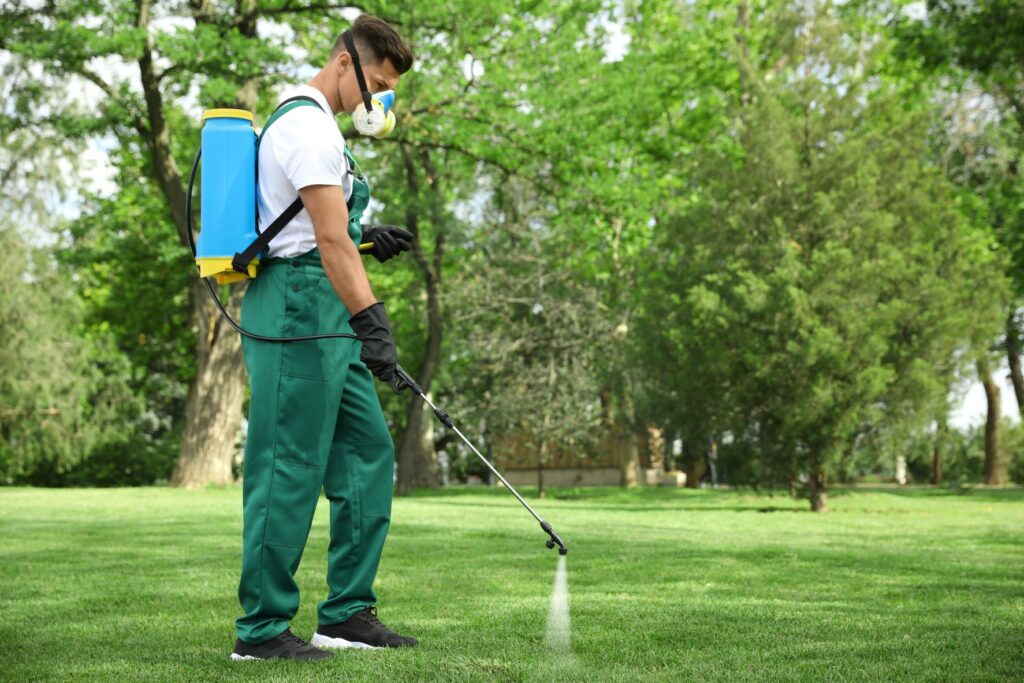The best lawn treatment is the one specifically formulated for your type of grass and your climate. Utah lawn service provider Lawngveity can help you determine what your lawn needs, and when.
Lawn Fertilizer
Not all lawns thrive on the same diet. Fertilizer provides nutrients for your grass, and it needs to contain the right ratio of nitrogen, phosphorus, and potassium for your type of turf. When you look at what a fertilizer contains, it’ll have an NPK ratio such as 1-2-3, with numbers indicating what percentage of each nutrient it contains.
- Nitrogen – Promotes greenery
- Phosphorus – Promotes root growth
- Potassium – Protects against disease and increases drought tolerance
So, how do you decide which fertilizer to purchase and apply to your lawn? A soil test will let you know what deficiencies if any, your lawn has. Armed with that information, you can purchase a fertilizer with the proper NPK ratio to nourish your grass and round out its diet.
Organic vs Synthetic Fertilizer
Your next question is whether you should use organic or synthetic fertilizer on your lawn. If you’re worried about burning your lawn with a heavy application of fertilizer, opt for organic formulas instead. Additionally, organic fertilizers are preferred by people who have children and pets in their homes since they’re made from living organisms that don’t pose health risks.
Liquid vs Granular Fertilizer
There are two forms of fertilizer to choose from: liquid and granular. Liquid requires dilution with water and typically needs to be applied more frequently than granular fertilizer. Like synthetic fertilizer, it can pose environmental risks if it gets into the local water supply. Although an effective application option, it may not be the best long-term lawn treatment.
Granular fertilizer is applied to the lawn using a walking or handheld spreader. It poses fewer environmental and health risks, so it’s a popular choice for many yard enthusiasts. It takes longer to release nutrients into the grass and requires fewer applications. The best of both worlds would be an organic, granular lawn fertilizer with slow-release nutrients.
Weed Control
The best lawn treatment for weed control is typically that which is preventative! If you can stop the weeds before they emerge, you’ll have less work on your hands. Lawngevity offers weed control that includes pre-emergents to control pesky intruders such as crabgrass and spurge.
Different types of weed control products include contact weed killers, selective weed killers, and systemic weed killers. They all pack a different punch when it comes to targeting the weed top or its root while leaving vegetation around it unscathed.
Types of Weeds
You need to know what type of weed you’re dealing with to choose the right weed control products.
- Annual Weeds – Live for a single season and drop seeds before dying in winter.
- Perennial Weeds – Have root systems so they can go dormant in winter and regrow in the spring.
- Biennial Weeds – Live for two growing seasons, dropping seeds at the end of the second year.
Like fertilizer, you can choose from synthetic and organic formulas with liquid and granular applications. Natural, non-toxic formulas might be best in a home with children and pets, even if it means more frequent applications. If you have questions about what you should use on your lawn, get in touch with Lawngevity today.
Insect Control
Did you know that some vegetation can serve as the first line of defense against pests in your yard? Well, flowers such as chrysanthemums, geraniums, marigolds, and petunias can deter pests such as mosquitos and aphids. Many natural insect repellents contain pyrethrin, a compound derived from chrysanthemums. Other natural insect-repelling plants include:
- Basil
- Chive
- Dill
- Lavender
- Mint
- Rosemary
- Sage
If these options don’t do the trick, diatomaceous earth is another popular lawn treatment for bugs. This powdery product destroys bugs’ exoskeletons so they dry up and die.
Sometimes, though, all-natural products don’t always deter ants, chinch bugs, grubs, or webworms from destroying your lawn and getting into your home. If that’s the case, Lawngevity can devise a treatment plan for insect control to be applied seven times per year. You’ll always be notified before a visit, and a licensed and insured individual will apply the products.
To create the perfect lawn treatment for your yard, get a free bid from Lawngevity. We’ll survey your landscape to determine what your needs are, and how we can best formulate custom solutions for you. We can be reached at 8001-618-2785, or you can contact us online HERE.


